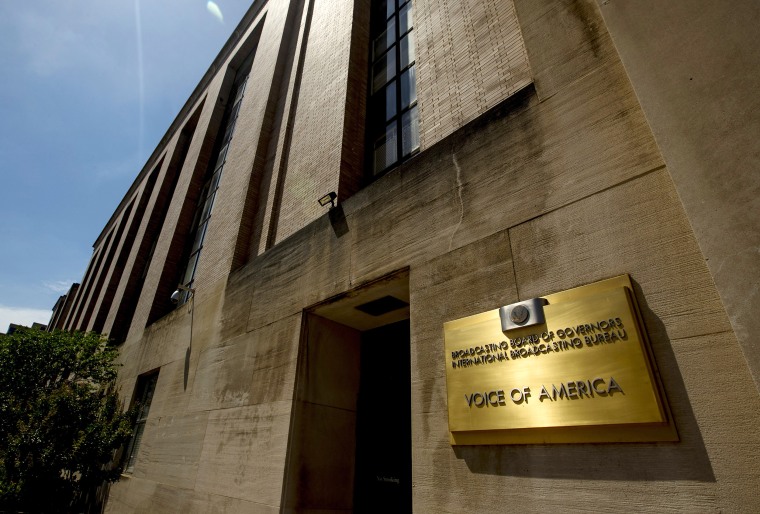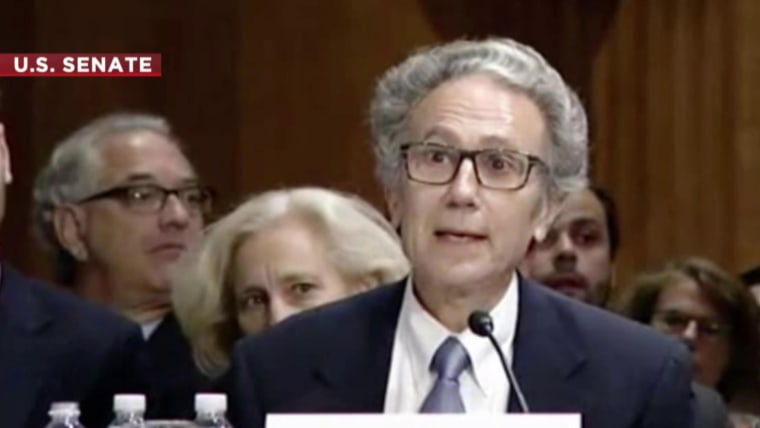Lawmakers and press freedom groups fear the administration is trying to turn the U.S.-funded news outlets into partisan mouthpieces.

The Voice of America building in Washington, on June 15, 2020.Andrew Harnik / AP file
Oct. 27, 2020, 12:47 AM MDT
By Dan De Luce
A senior U.S. official appointed by President Donald Trump has scrapped a federal regulation designed to protect the editorial independence of Voice of America and other U.S.-funded media outlets, amid accusations he is undermining the journalistic credibility of the broadcasters.
Michael Pack, CEO of the U.S. Agency for Global Media who rescinded the editorial “firewall” regulation late Monday night, said the federal rule was legally flawed, infringed on the president’s right to conduct U.S. foreign policy and was "unworkable.”
Reporters at the U.S.-funded broadcasters have accused Pack of trying to turn the service into a mouthpiece for Trump, and former executives said they expected legal challenges to the decision.

JUNE: Firings at U.S. funded media agency spark concerns of politicization as Trump-appointee takes helm JUNE 22, 202004:38
The federal regulation granting editorial independence was introduced in June by an outgoing board of governors that used to oversee the U.S.-funded broadcasters. The board was dissolved once Pack was confirmed by the Senate in a party-line vote as CEO of the U.S. Global Media Agency (USAGM), the parent agency for Voice of America, Radio Free Asia, Radio Free Europe/Radio Liberty and other federally funded broadcasters.
The regulation, titled “Firewall and Highest Standards of Professional Journalism,” had prohibited any interference in the editorial work of the U.S. media outlets. It barred executives or officials outside the newsroom from “attempts to direct, pressure, coerce, threaten, interfere with, or otherwise impermissibly influence any of the USAGM Networks, including their leadership, officers, employees, or staff, in the performance of their journalistic and broadcasting duties and activities.”
In announcing his decision Monday night, Pack argued that the regulation wrongly described the U.S.-funded outlets as equivalent to private news organizations and maintained that VOA and the other broadcasters have a mission to promote U.S. foreign policy interests, unlike private-sector media.
He also said that the regulation was impractical and could prevent him from carrying out his legally mandated duties.
“Not only was this rule based on flawed legal and constitutional reasoning, it made the agency difficult to manage and less able to fulfill its important mission to inform, engage and connect people around the world in support of freedom and democracy,” Pack said in his statement.
“No agency run by a CEO, or another type of head, has any kind of ‘firewall’ between himself and the rest of his agency,” he said.
Press freedom groups, lawmakers from both parties, former executives at the agency and current and former journalists at the U.S.-funded outlets have blasted Pack’s tenure as CEO, saying he has tarnished the reputation of the broadcasters and hurt America’s image abroad as a champion of a free press.
At a congressional hearing last month, former USAGM officials sharply criticized Pack for placing commentaries on the news outlets’ homepages, firing the head of editorial standards, sacking the chiefs of all the broadcasters, refusing to renew visas for foreign journalists working at the agency, withholding funding for some daily operations and saying the agency would be “a great place to put a spy.”
“Our reputation for telling the truth has been a core element of our strength as a nation. Now, it is in danger, putting at risk not only our national values, but also our national security,” Ryan Crocker, a retired senior diplomat who served on the former board of governors for the U.S.-funded broadcasters, told lawmakers at a September congressional hearing.
Republican lawmakers have expressed frustration in particular over Pack’s decision to block about $20 million in funding for a non-profit that provides anti-censorship technology to people in repressive societies, including Belarus, China and Iran. They said the move had cut off democracy activists in Hong Kong and elsewhere in their hour of need.
The U.S. Global Media Agency, with of budget of about $800 million, oversees broadcasters that reach an estimated 350 million people a week in 62 languages.
Dan De Luce
Dan De Luce is a reporter for the NBC News Investigative Unit.
Oct. 27, 2020, 12:47 AM MDT
By Dan De Luce
A senior U.S. official appointed by President Donald Trump has scrapped a federal regulation designed to protect the editorial independence of Voice of America and other U.S.-funded media outlets, amid accusations he is undermining the journalistic credibility of the broadcasters.
Michael Pack, CEO of the U.S. Agency for Global Media who rescinded the editorial “firewall” regulation late Monday night, said the federal rule was legally flawed, infringed on the president’s right to conduct U.S. foreign policy and was "unworkable.”
Reporters at the U.S.-funded broadcasters have accused Pack of trying to turn the service into a mouthpiece for Trump, and former executives said they expected legal challenges to the decision.

JUNE: Firings at U.S. funded media agency spark concerns of politicization as Trump-appointee takes helm JUNE 22, 202004:38
The federal regulation granting editorial independence was introduced in June by an outgoing board of governors that used to oversee the U.S.-funded broadcasters. The board was dissolved once Pack was confirmed by the Senate in a party-line vote as CEO of the U.S. Global Media Agency (USAGM), the parent agency for Voice of America, Radio Free Asia, Radio Free Europe/Radio Liberty and other federally funded broadcasters.
The regulation, titled “Firewall and Highest Standards of Professional Journalism,” had prohibited any interference in the editorial work of the U.S. media outlets. It barred executives or officials outside the newsroom from “attempts to direct, pressure, coerce, threaten, interfere with, or otherwise impermissibly influence any of the USAGM Networks, including their leadership, officers, employees, or staff, in the performance of their journalistic and broadcasting duties and activities.”
In announcing his decision Monday night, Pack argued that the regulation wrongly described the U.S.-funded outlets as equivalent to private news organizations and maintained that VOA and the other broadcasters have a mission to promote U.S. foreign policy interests, unlike private-sector media.
He also said that the regulation was impractical and could prevent him from carrying out his legally mandated duties.
“Not only was this rule based on flawed legal and constitutional reasoning, it made the agency difficult to manage and less able to fulfill its important mission to inform, engage and connect people around the world in support of freedom and democracy,” Pack said in his statement.
“No agency run by a CEO, or another type of head, has any kind of ‘firewall’ between himself and the rest of his agency,” he said.
Press freedom groups, lawmakers from both parties, former executives at the agency and current and former journalists at the U.S.-funded outlets have blasted Pack’s tenure as CEO, saying he has tarnished the reputation of the broadcasters and hurt America’s image abroad as a champion of a free press.
At a congressional hearing last month, former USAGM officials sharply criticized Pack for placing commentaries on the news outlets’ homepages, firing the head of editorial standards, sacking the chiefs of all the broadcasters, refusing to renew visas for foreign journalists working at the agency, withholding funding for some daily operations and saying the agency would be “a great place to put a spy.”
“Our reputation for telling the truth has been a core element of our strength as a nation. Now, it is in danger, putting at risk not only our national values, but also our national security,” Ryan Crocker, a retired senior diplomat who served on the former board of governors for the U.S.-funded broadcasters, told lawmakers at a September congressional hearing.
Republican lawmakers have expressed frustration in particular over Pack’s decision to block about $20 million in funding for a non-profit that provides anti-censorship technology to people in repressive societies, including Belarus, China and Iran. They said the move had cut off democracy activists in Hong Kong and elsewhere in their hour of need.
The U.S. Global Media Agency, with of budget of about $800 million, oversees broadcasters that reach an estimated 350 million people a week in 62 languages.
Dan De Luce
Dan De Luce is a reporter for the NBC News Investigative Unit.
No comments:
Post a Comment